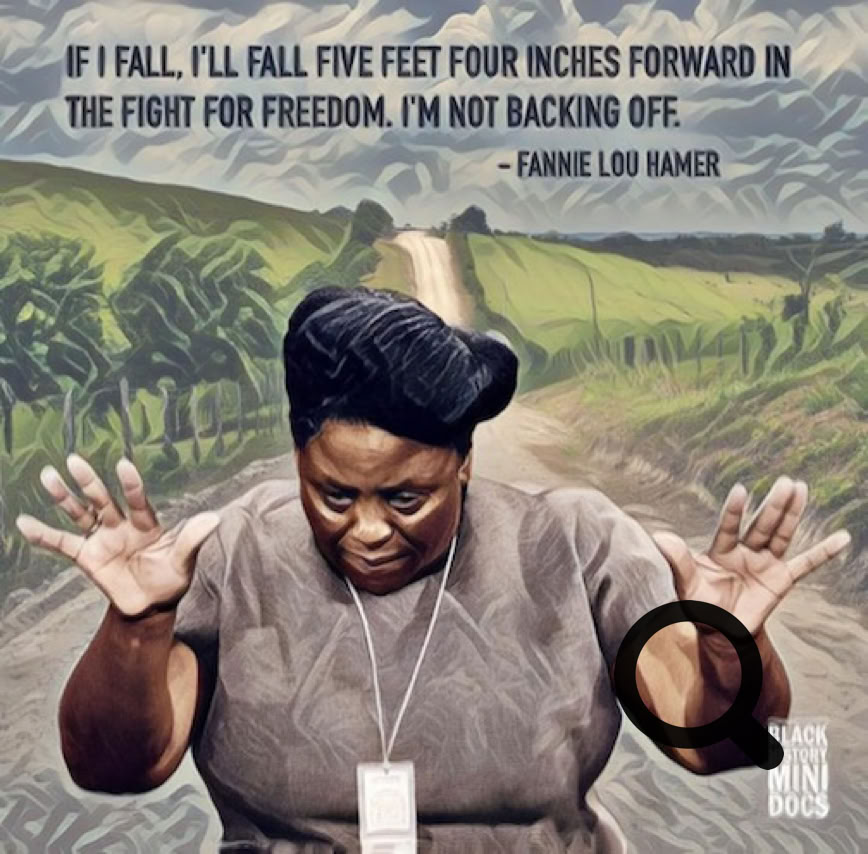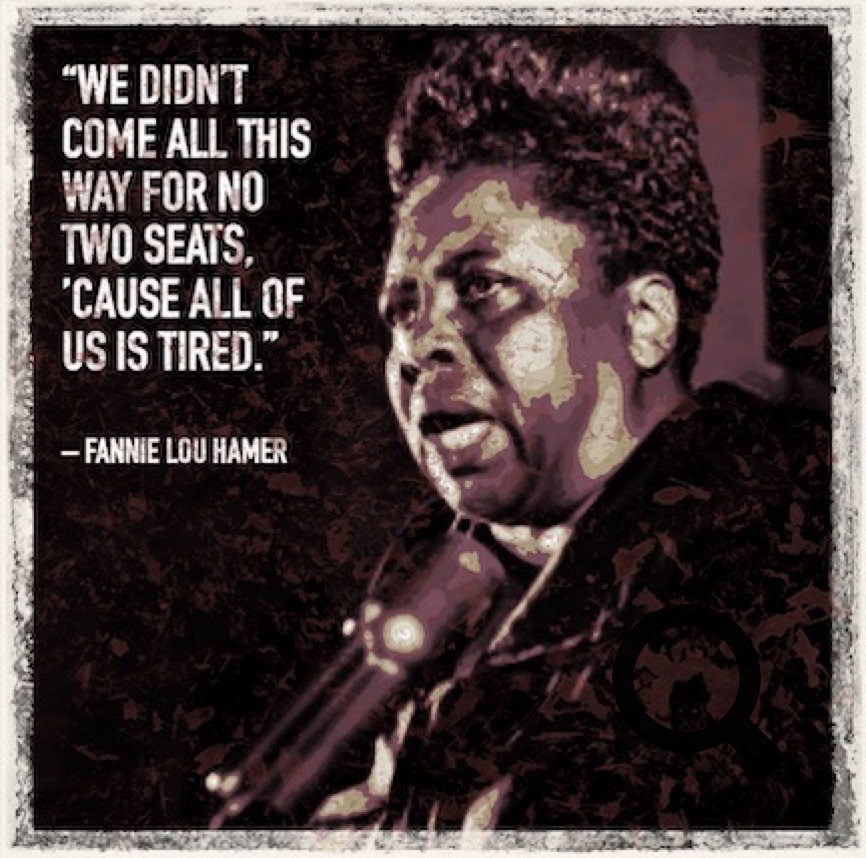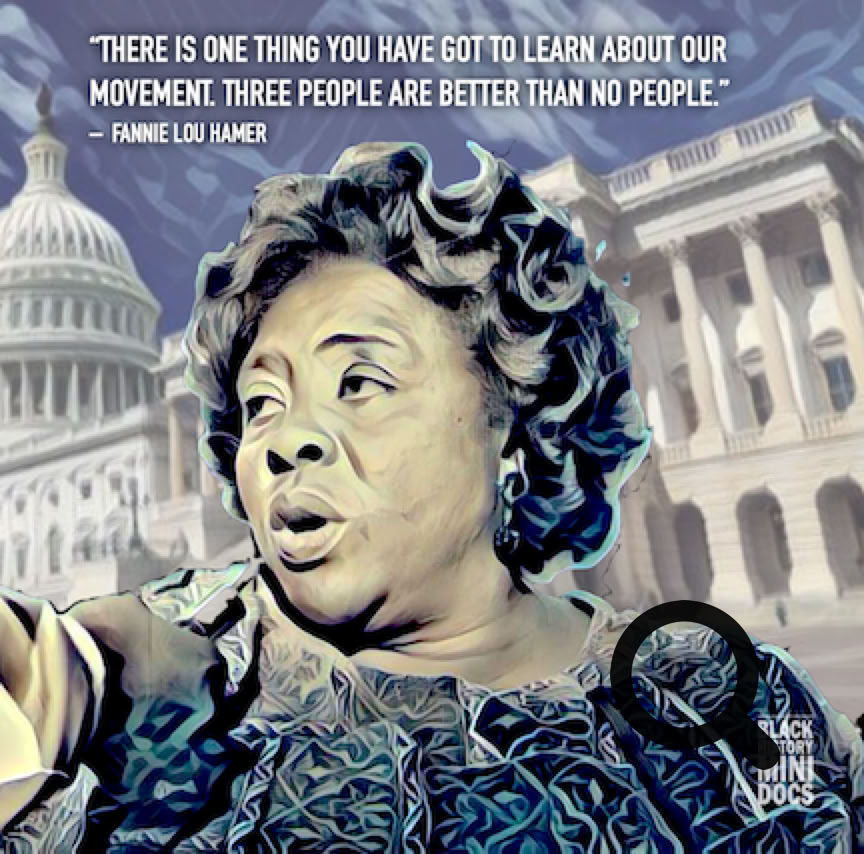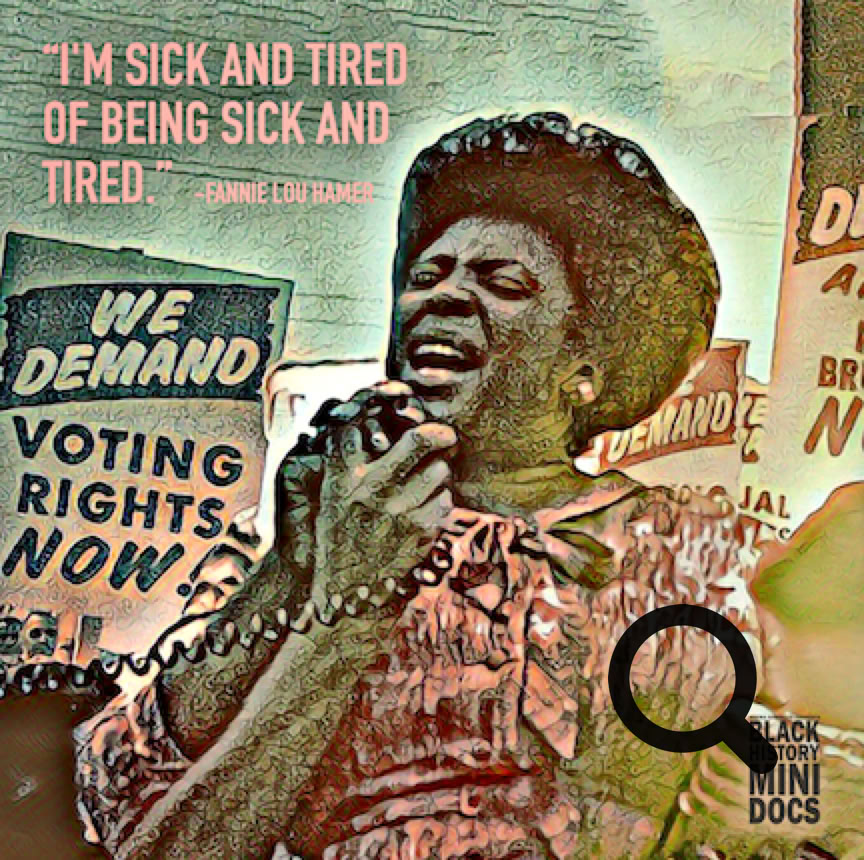

FANNIE LOU HAMER MINI DOC

FANNIE LOU HAMER QUOTES

ABOUT FANNIE LOU HAMER
Hamer (born Fannie Lou Townsend on October 6, 1917 was a grass-roots civil rights activist whose life exemplified resistance in rural Mississippi to oppressive conditions and for voting rights. Hamer became a national figure during the summer of 1964 as the co-founded the Mississippi Freedom Democratic Party (MFDP). Her epitaph reads: “I’m sick and tired of being sick and tired.” Please take 90 seconds to watch our Mini Doc on this extraordinary freedom fighter and warrior Queen, Fannie Lou Hamer.
Fannie Lou Hamer's life took a dramatic turn the day she showed up for a mass meeting to learn about voting. It was August 1962 and Hamer, who was forty-four years old, wasn't even sure what a "mass meeting" was. "I was just curious to go, so I did," she said. The meeting was organized by the Student Nonviolent Coordinating Committee (SNCC) and Hamer was told something she'd never heard before: black people had the right to vote.
One of twenty children born to a family of sharecroppers in the Mississippi Delta, Hamer grew up picking cotton and cutting corn and attended school through the sixth grade. She married a fellow sharecropper and the two scratched out a living doing hard, menial work on a plantation near Ruleville, Mississippi.
According to biographer Sina Dubovoy, when Hamer heard SNCC's presentation, she asked herself, "What did she really have? Not even security." A lynching in a nearby town in 1904 had terrorized blacks then, and the ever-present KKK still kept them quiet. As Dubovoy notes, "The Mississippi Delta was the world's most oppressive place to live if you were black. Hamer decided on the spot to register to vote. On August 31, 1962, she boarded a bus to Indianola with seventeen others to try to register to vote. The next day she was kicked off the plantation where she had lived and worked for eighteen years. Her husband lost his job, too.
Hamer immediately went to work as a field organizer for SNCC. Returning home from a training workshop in June 1963, Hamer's bus was intercepted by policemen. She and two others were taken to jail in Winona, Mississippi, and mercilessly beaten. Hamer suffered permanent damage to her kidneys. After recovering from her injuries, she traveled across the U.S. telling her story. With her genuine, plainspoken style, Hamer raised more money for SNCC than any other member.
In 1964, with the support of the Mississippi Freedom Democratic Party (MFDP), Hamer ran for Congress. The incumbent was a white man who had been elected to office twelve times. In an interview with the Nation, Hamer said, "I'm showing the people that a Negro can run for office." The reporter observed: "Her deep, powerful voice shakes the air as she sits on the porch or inside, talking to friends, relatives and neighbors who drop by on the one day each week when she is not campaigning. Whatever she is talking about soon becomes an impassioned plea for a change in the system that exploits the Delta Negroes. 'All my life I've been sick and tired, she shakes her head. 'Now I'm sick and tired of being sick and tired.
SNCC had formed the MFDP to expand black voter registration and challenge the legitimacy of the state's all-white Democratic Party. MFDP members arrived at the 1964 Democratic National Convention intent on unseating the official Mississippi delegation or, failing that, getting seated with them. On August 22, 1964, Hamer appeared before the convention's credentials committee and told her story about trying to register to vote in Mississippi. Threatened by the MFDP's presence at the convention, President Lyndon Johnson quickly preempted Hamer's televised testimony with an impromptu press conference. But later that night, Hamer's story was broadcast on all the major networks.
Support came pouring in for the MFDP from across the nation. But the MFDP's bid to win a seat at the Atlantic City convention still failed. At the Democratic National Convention in Chicago four years later the MFDP succeeded. On that occasion, Dubovoy recounts, "Hamer received a thunderous standing ovation when she became the first African American to take her rightful seat as an official delegate at a national-party convention since the Reconstruction period after the Civil War, and the first woman ever from Mississippi.
Copyright Black History Mini Docs Inc. 2026 All Rights Reserved.

















